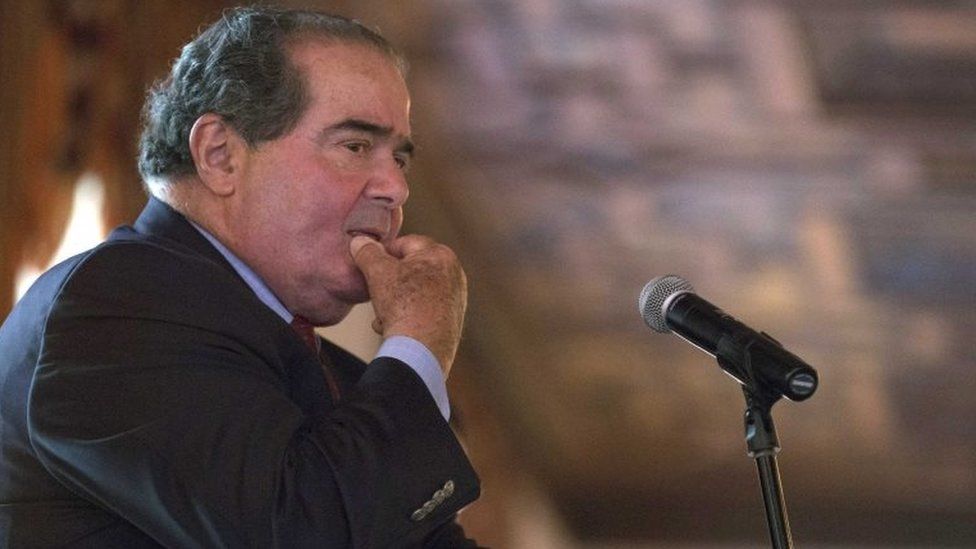Antonin Scalia death: Questions asked as US fights over successor
- Published

Questions have been raised over the handling of US Supreme Court Justice Antonin Scalia's death, as political sniping over his successor continues.
A judge ruled that Mr Scalia died from natural causes despite initial confusion over the cause of death.
The judge said she had been assured "there were no signs of foul play".
US President Barack Obama is expected to nominate a new justice in coming weeks but Republicans want the decision to be left to his successor next year.
The question of who will replace Mr Scalia, a powerful conservative voice in America's highest court, is turning into a big battle between Republicans and Democrats in a crucial presidential election year, and could spark a constitutional crisis.
No autopsy
Republican presidential frontrunner Donald Trump described the circumstances surrounding Mr Scalia's death as "unusual" in a discussion with prominent conservative radio show host Michael Savage on Tuesday.
Mr Savage, whose radio show draws in millions of listeners, called for "an immediate autopsy before the body is disposed of".
The timing of Mr Scalia's death has caused conspiracy theories to abound, with some questioning why no autopsy was performed and the exact cause of death still to be determined.
A former head of criminal investigations for Washington police, William O Ritchie, has spoken out on Facebook, saying he was "stunned that no autopsy was ordered for Justice Scalia".
But, according to the Washington Post, the manager of the funeral home in El Paso that handled Mr Scalia's body said the justice's family insisted on not having an autopsy performed.
Analysis: Anthony Zurcher, BBC News North America reporter
It had to be Texas, didn't it? From the state that brought you half a century of John F Kennedy assassination conspiracies, complete with their own autopsy questions, comes a new controversy.
Of course, Kennedy was murdered in broad daylight on a Dallas street. Scalia, on the other hand, was a 79-year-old man with known heart ailments who died in his sleep. But that's obviously not going to stop speculation from running rampant.
It's a testament to the impact a vacancy on the Supreme Court will have on US politics that it took only a few days for tales of intrigue and deception to spring up.
If President Barack Obama is able to appoint Scalia's successor, or if a Democratic president does so next year, it could tilt the ideological balance on the court to the left for years. The stakes are extremely high, and the benefits to the liberal cause are obvious - key ingredients for a good conspiracy theory.
In 1992 John Grisham published his first best-selling novel, The Pelican Brief, which centred around the assassination of Supreme Court justices for political gain. Some things are better left as works of fiction.
Some questioned the account of an acquaintance of Mr Scalia, who described the moment he found the judge dead at a ranch in Texas on Saturday.
"We discovered the judge in bed, a pillow over his head. His bed clothes were unwrinkled," John Poindexter was quoted as saying.
Presidio County Judge Cinderela Guevara said she had pronounced his death without seeing the body, which is permissible under Texas law. It had also reportedly taken some time to find a judge to rule on the death.
She was reported to originally put the cause of death as a heart attack, but later changed it to natural causes explaining she had only meant that Mr Scalia's heart had stopped.
The 79-year-old had a history of heart trouble and high blood pressure, Judge Guevara said after speaking with Mr Scalia's doctor and police after his death on Saturday. She said there had been "no foul play".
A White House spokesman told reporters on Monday that President Obama had begun preliminary discussions with his team on who to nominate as his successor.
Mr Scalia's death leaves the Supreme Court evenly divided between liberal and conservative justices ahead of crucial cases on abortion, voting rights and immigration.
Until now, the conservatives had been in the majority but a new judge could tip the balance, and Republicans running for president are strongly opposed to Mr Obama making his choice.
According to the constitution, the president nominates justices to the court and the Senate - currently controlled by the Republicans - uses its "advice and consent" powers to confirm or reject that person.
White House spokesman Eric Schultz criticised a growing number of Republican senators on Tuesday for saying they would not support President Obama's nomination.
He described it as "a lot of bluster, only to have reality ultimately sink in," in reference to past battles over the US debt limit and the nuclear deal with Iran.
There will be no announcement before the Senate returns on 22 February, Mr Schultz said.
Americans are due to vote on a new president in November later this year.
- Published14 February 2016
- Published14 February 2016
- Published8 February
- Published16 June 2015